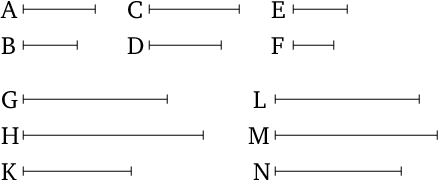Proposition: 5.12: Sum of Components of Equal Ratios
(Proposition 12 from Book 5 of Euclid's “Elements”)
If there are any number of magnitudes whatsoever (which are) proportional then as one of the leading (magnitudes is) to one of the following, so will all of the leading (magnitudes) be to all of the following.
- Let there be any number of magnitudes whatsoever, $A$, $B$, $C$, $D$, $E$, $F$, (which are) proportional, (so that) as $A$ (is) to $B$, so $C$ (is) to $D$, and $E$ to $F$.
- I say that as $A$ is to $B$, so $A$, $C$, $E$ (are) to $B$, $D$, $F$.

Modern Formulation
In modern notation, this proposition reads that if \[\frac\alpha{\alpha'}=\frac\beta{\beta'}=\frac\gamma{\gamma'}=\ldots.\]
then
\[\frac\alpha{\alpha'}=\frac{\alpha+\beta+\gamma+\cdots}{\alpha'+\beta'+\gamma'+\cdots},\]
for all positive real numbers.
Table of Contents
Proofs: 1
Mentioned in:
Proofs: 1 2 3 4 5 6 7 8 9 10
Sections: 11
Thank you to the contributors under CC BY-SA 4.0! 

- Github:
-

- non-Github:
- @Fitzpatrick
References
Adapted from (subject to copyright, with kind permission)
- Fitzpatrick, Richard: Euclid's "Elements of Geometry"
Adapted from CC BY-SA 3.0 Sources:
- Prime.mover and others: "Pr∞fWiki", https://proofwiki.org/wiki/Main_Page, 2016
